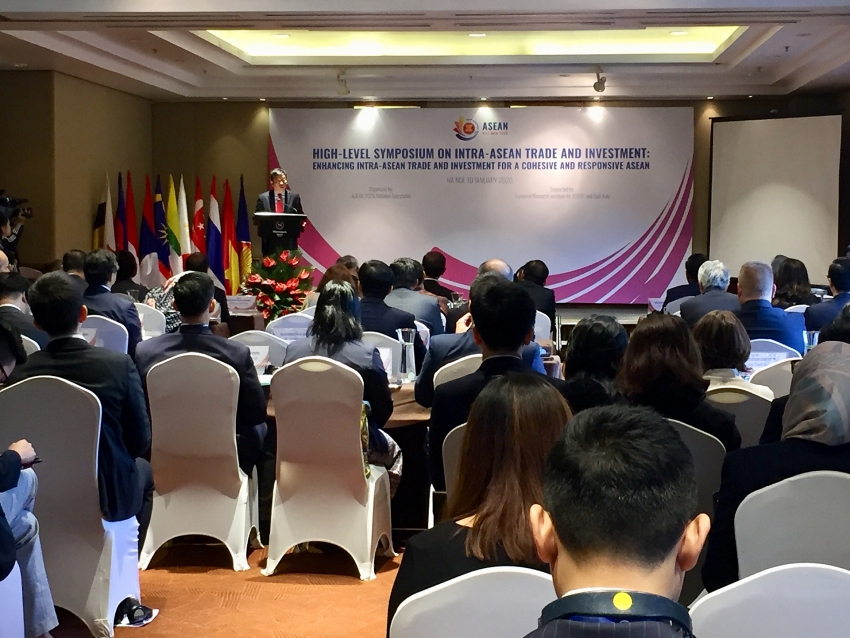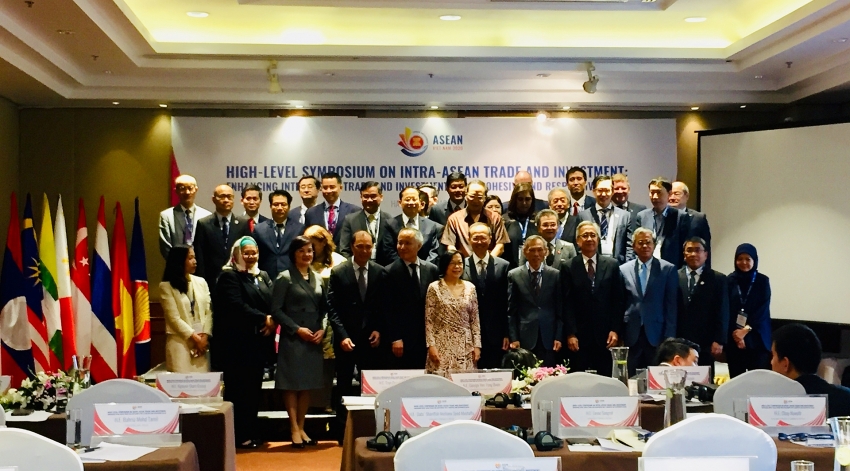Policymakers gather for symposium on intra-ASEAN trade in Hanoi
 |
| The High-Level Symposium on Intra-ASEAN Trade and Investment |
Addressing the event, Deputy Minister of Industry and Trade Tran Quoc Khanh affirmed that the ASEAN is one of the most successful groups in the world, reaping many achievements in the course of its existence.
“Our total trade value has increased from about $89 billion in 1996 to $520 billion in 2019. For Vietnam, our trade with the ASEAN ranged from about $4 billion in 1996 to $58 billion in 2019,” he said.
According to Khanh, facing newly-emerging challenges such as trade competition and protectionism, the ASEAN needs to unite, maintain cohesion and efficiency to ensure the progress of the implementation of the Master Plan of ASEAN Economic Community 2025, and continue to promote its role as a driving force for regional economic integration.
 |
| The speakers of the symposium |
Aladdin D. Rillo, deputy secretary general of the ASEAN Economic Community, ASEAN Secretariat, emphasised that the ASEAN needs to play a more active role in the open, inclusive, and rules-based multilateral trading system of the region, and consolidate the infrastructure, including digital infrastructure, regulatory reforms, and human resources development.
Meanwhile, representatives from business associations expressed their desire for ASEAN governments to quickly act in promoting investment and trade, creating conditions for businesses to connect and benefit from trade agreements and ASEAN investment.
At the symposium, representatives identified main barriers to intra-ASEAN trade and investment flows, focusing on three clusters of key issues, including policy and institutional barriers; participation in the ASEAN's value chains; and supply chain development.
Former Vietnamese Minister of Trade Truong Dinh Tuyen said that in order to deal more effectively with barriers and difficulties, ASEAN countries need to step up institutional and business environment reform. "During the process of upgrading existing trade and investment agreements, the ASEAN should take the standards of the new generation of free trade agreements as a reference to build high-quality and comprehensive agreements." he said.
What the stars mean:
★ Poor ★ ★ Promising ★★★ Good ★★★★ Very good ★★★★★ Exceptional
Related Contents
Latest News
More News
- Spring Fair 2026 boosts domestic demand (March 02, 2026 | 16:30)
- Law on Investment takes effect (March 02, 2026 | 16:21)
- Ho Chi Minh City attracts nearly $980 million in FDI in early 2026 (March 02, 2026 | 10:57)
- Businesses bouncing back after turbulent year (February 27, 2026 | 16:42)
- VinaCapital launches Vietnam's first two strategic-beta ETFs (February 26, 2026 | 09:00)
- PM sets five key tasks to accelerate sci-tech development (February 26, 2026 | 08:00)
- PM outlines new tasks for healthcare sector (February 25, 2026 | 16:00)
- Citi report finds global trade transformed by tariffs and AI (February 25, 2026 | 10:49)
- Vietnam sets ambitious dairy growth targets (February 24, 2026 | 18:00)
- Vietnam, New Zealand seek level-up in ties (February 19, 2026 | 18:06)

 Tag:
Tag:


























 Mobile Version
Mobile Version